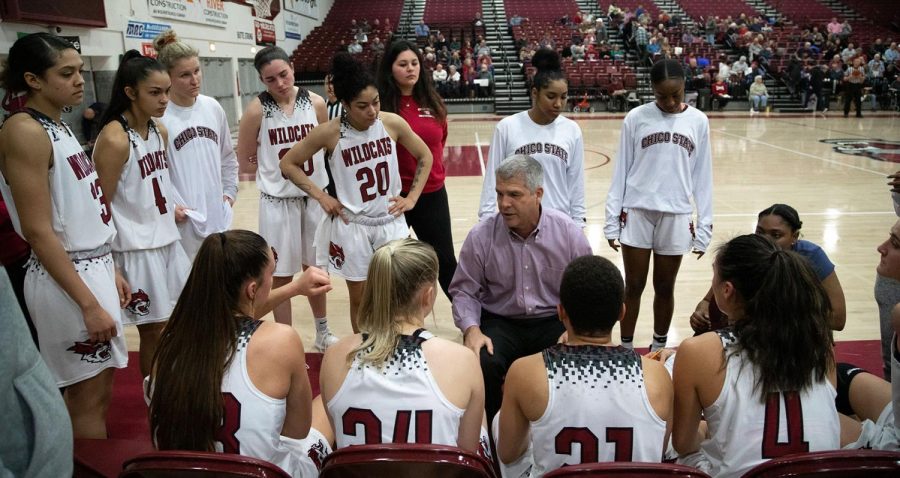The 2021 March Madness basketball tournament became mired in controversy after Stanford women’s basketball coach Ali Kershner leaked photos highlighting the major disparity in facilities provided to men and women teams.
The images showed a fully equipped locker room in the men’s facilities compared to only a set of dumbbells and yoga mats for the women’s team. A firestorm erupted on social media but women college athletes at Chico State were not surprised.
Chico State women’s basketball guard Morgan Mathis said unequal facilities and treatment are nothing new.
“Women’s sports, since the very beginning, have been looked down upon,” Mathis said. “We just aren’t treated the same as the other athletes and it’s pretty frustrating.”
Chico State women’s basketball forward Haley Ison has noticed a difference in treatment and attitude by the NCAA, but not by Chico State. Ison said women athletes work just as hard as the men and deserve equal treatment, but the NCAA often sees it differently.

“The NCAA is happy to have the men’s team there,” Ison said. “But it’s a privilege for the women’s team to be there.”
Ison made clear that she believes Chico State has a more equitable program.
“I think that Chico does a very good job of making everybody feel included,” Ison said. “I personally haven’t experienced any disparity in treatment between the men’s team and the women’s team here. It’s still nice to know that there are still plenty of people here at Chico State that support our women’s basketball program.”
Chico State women’s head basketball coach Brian Fogel, who is also a parent, wants to see improvements in opportunity and funding for future generations.
“I’m a parent of two daughters,” Fogel said. “I always would like the same opportunities to be presented to my daughters.”
Fogel said the NCAA should be held accountable. He feels strongly that funding for women’s college basketball should match that of men’s, so that women are given the same equipment and opportunities.
“There has to be a plan and follow through, and there has to be action,” Fogel said. “Holding people accountable is the other part that is very important. The NCAA and whoever is in charge needs to be held accountable.”
Fogel gives Chico State Athletic Director Anita Barker credit for being an advocate for women’s sports.

“We want all of our athletes, male and female, to be treated in a way that’s respectful of the sport they play, the training they do, the access they have to coaching and other resources,” Barker said. “I think there’s no difference anymore, as far as male and female athletes.”
Barker said Divisions II and III’s resources are distributed more evenly across the board. She said Chico State, a Division II school, provides equal resources for men’s or women’s sports.
“In Division II, all of our student athletes that travel on the road have the same access to resources and championships,” Barker said. “It’s already built in to the way Division II and III do it that all the resources used for team or individual sports are allocated equitably across the genders.”
Passed in 1972, Title IX of the Education Amendments Act, was the response to discrimination against women, especially in sports. Before Title IX, women rarely received athletic scholarships, and the NCAA did not have any women-only championships.
“No person in the United States shall, on the basis of sex, be excluded from participation in, be denied the benefits of, or be subjected to discrimination under any education program or activity receiving Federal financial assistance,” as written in the Title IX of the act.
Women’s involvement in collegiate athletics has increased significantly since it came into effect. Money has been allocated more equally and today, about five times the amount of women participate in college sports than when Title IX first passed. Barker said that Title IX has, over time, helped make college sports more equitable.
“Title IX became a law in 1972,” Barker said, “It’s been a long time since legally it’s been a requirement.”
Connor McPherson can be reached at orionmanagingeditor@gmail.com or @theGOATMcphers1 on Twitter.





